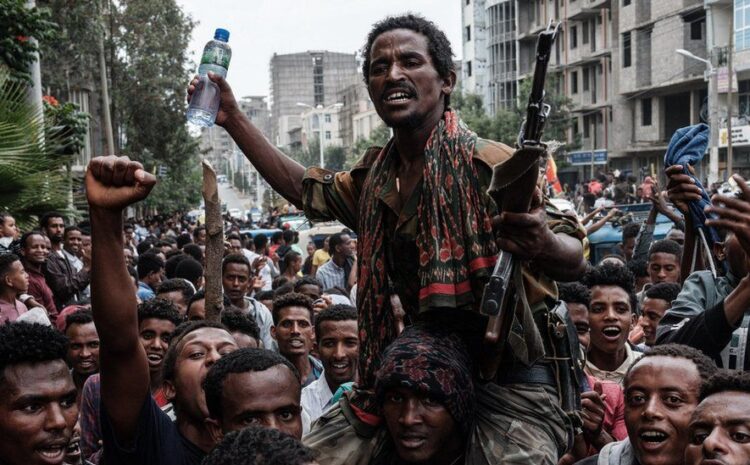
IMAGE SOURCE GETTY IMAGES image caption Tigrayan rebel forces have made big gains since June
Ethiopia’s prime minister has called on civilians to join the army in its fight against rebels in the Tigray region.
Abiy Ahmed asked “all capable Ethiopians” to “show their patriotism” by joining the war, which is raging across the north of the country.
Fighting has escalated since June when the rebels, led by the Tigray People’s Liberation Front (TPLF), recaptured much of Tigray in an offensive.
This came after the federal army had withdrawn and declared a ceasefire.
In his statement, Mr Abiy – a Nobel Peace Prize winner – said the whole country had to get behind the battle to defeat the TPLF.
“The media, artists and social activists are expected to contribute towards strengthening the people’s support for the country,” he said.
The TPLF has been designated a terrorist organisation by the government. But the group says it is the legitimate regional government of Tigray.
Fighting broke out in November 2020 between government troops and the TPLF, which ruled Ethiopia for decades and now controls Tigray.
The conflict has forced over two million people to flee their homes, with hundreds of thousands pushed into famine conditions.

Six weeks ago, the government announced a unilateral humanitarian ceasefire, after losing control of key areas including the regional capital, Mekelle.
It said the ceasefire would stay in place until the farming season ended. The main planting season runs from June to September.
But the prime minister’s statement accused the rebels of stopping aid and not allowing farmers to plant crops.
“It has become apparent that Tigrayan farmers will not be able to farm safely unless the people of Tigray are forever separated from the terrorist group,” Mr Abiy said.
The statement also took aim at some in the international community. The prime minister blamed them for the “machinations of foreign hands” in the war, and alleged some had been caught “red-handed supporting the [Tigray forces] under the disguise of humanitarian aid.”

Under pressure, Abiy makes bold shift
Catherine Byaruhanga, BBC Africa Correspondent
Ethiopia’s government once called the conflict in Tigray a “law and order operation”, and in November declared victory. But it is a sign of a significant shift that Prime Minister Abiy Ahmed is now calling for every Ethiopian of age to sign up.
Last week, Tigrayan forces captured the ancient city of Lalibela in Amhara – seemingly without a fight.
Fighting has also been reported in the strategic city of Weldiya.
While regional forces and militia have continued fighting the government insists the federal army stopped taking part in active conflict at the end of June – adhering to a unilateral ceasefire for humanitarian reasons.
But its losses in Tigray before the announcement were significant and thousands of its troops were captured.
A national “call to arms” is a bold statement but there are questions about what underpins it and the true strength of the federal military.
